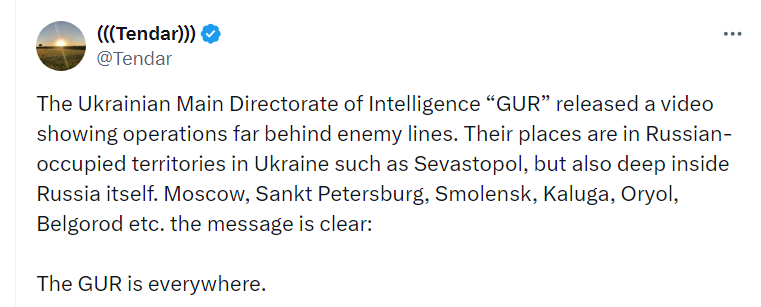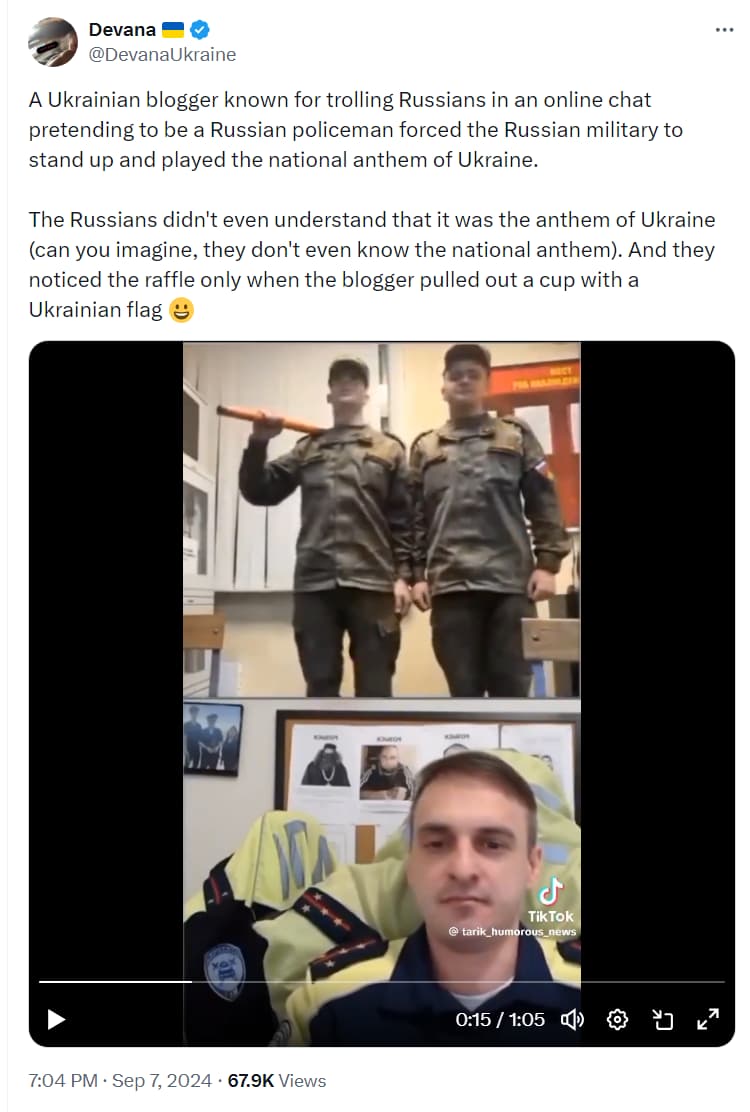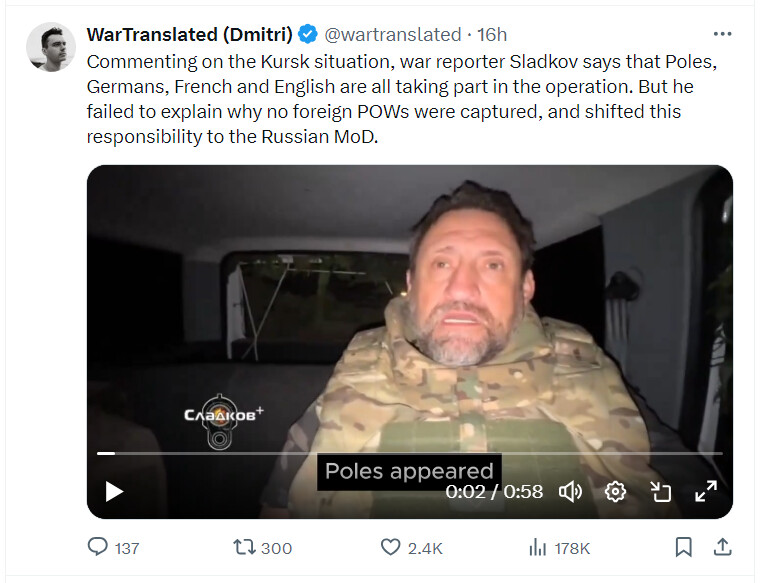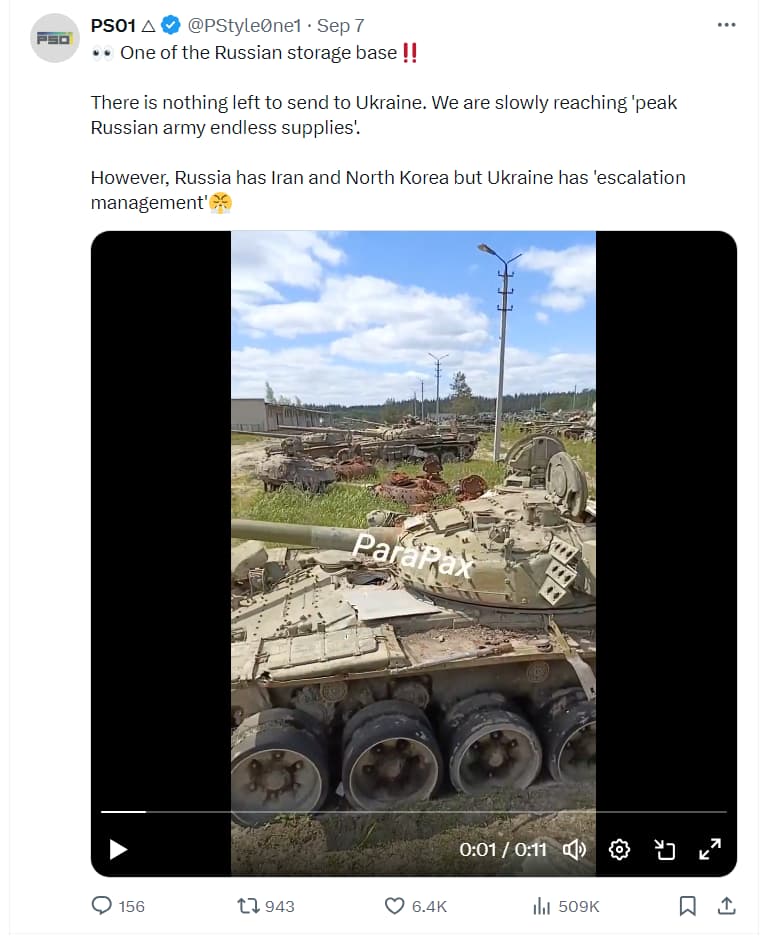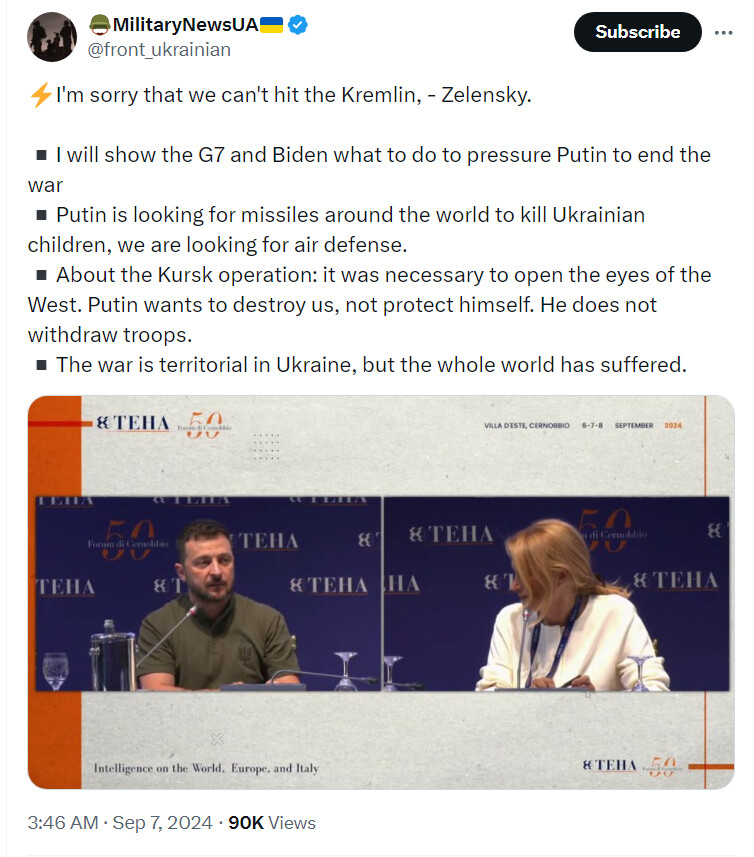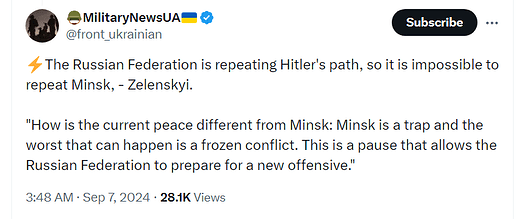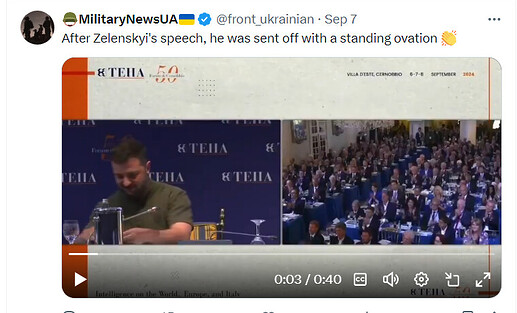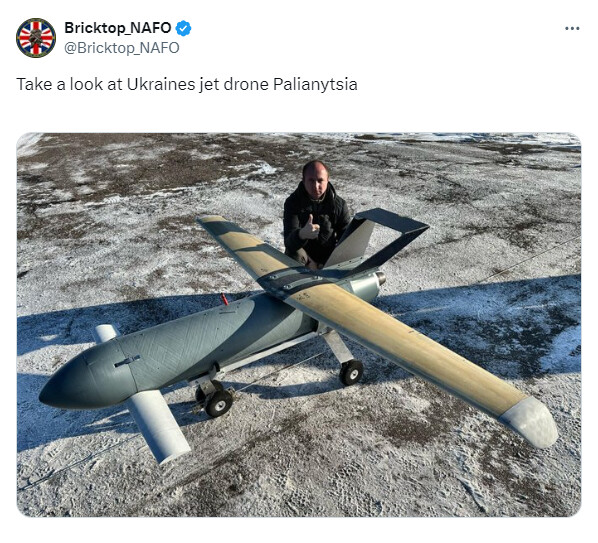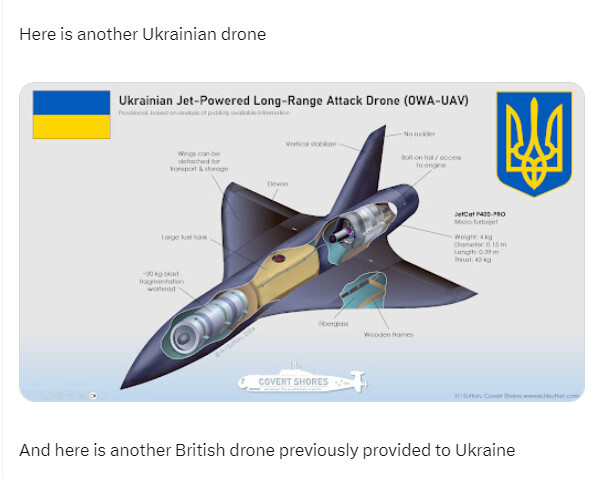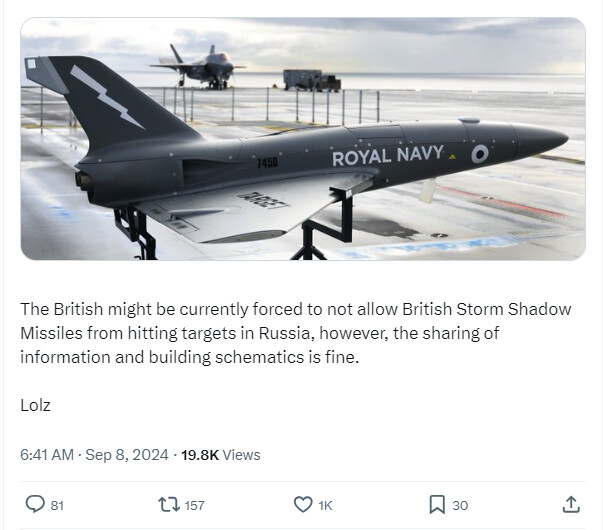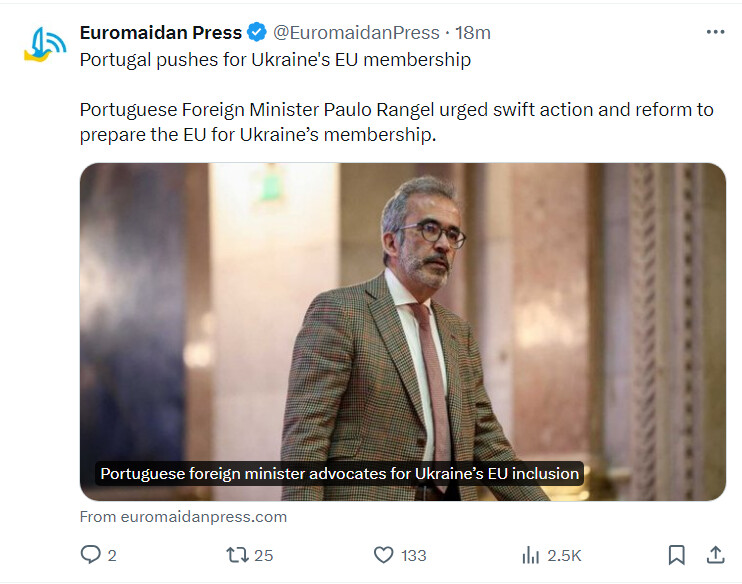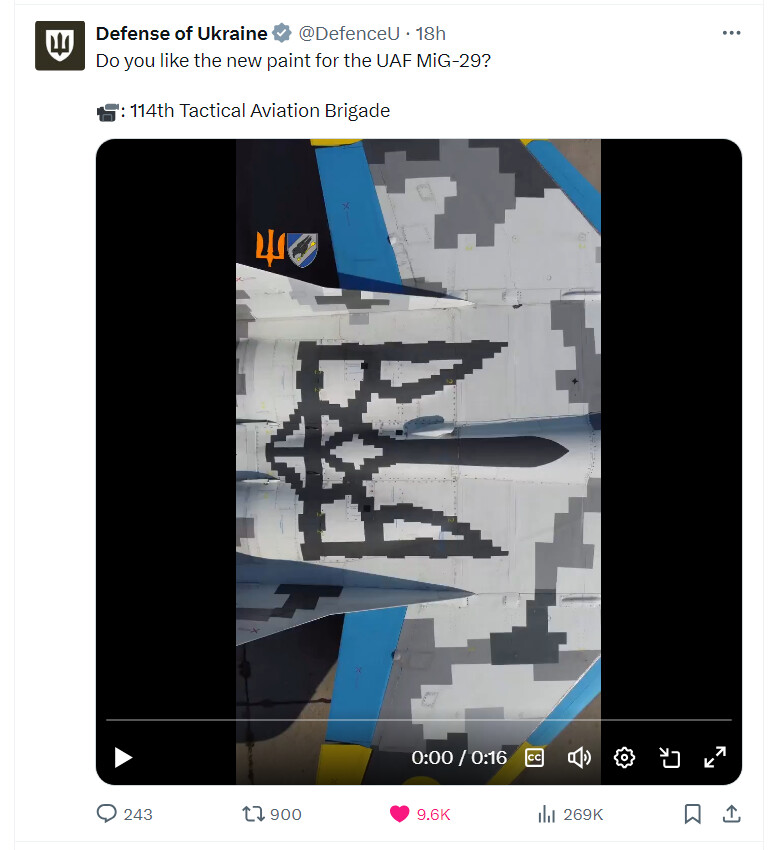I previously made the comment that the Kursk incursion had another side benefit: getting a foot into the door of russian territory would more easily allow the GUR and other Ukrainian Intelligence agencies to proliferate the spread of russian-speaking operatives to the four corners of russia to carry out recon/intel gathering/sabotage/influence operations. This video confirms it.
Bump!
Thanks again @sweatyman for your ceaseless and tireless work on the Blitz frontlines!
Another sad example of the russians desperately trying to find NATO opponents so as to justify their propaganda-driven, self-imposed, erroneous world-view of Ukrainians being untermenshen…
russian tank reserves are looking really bad. In this one depot, what looks like only dregs are left. If they resupply stocks with new tanks from their Chinese (sanctions!) and North Korean allies then Ukraine can always kill those too…
I think the US decision making process is entirely determined by US national self-interest. If loss of Ukrainian lives is considered an unfortunate but external factor, then we are led directly to what is occurring now ie support for the defence of Ukraine, but prioritising avoiding a wider conflict that directly involves NATO troops. Even though we see this as a remote possibility eventuating from the imaginary red line being crossed - because the worst case scenario is armageddon, this (myth?) gets factored in to US decision making.
Looking on from far away, we recognise the immorality of this position. We see the US hypocrisy in providing weapons but not allowing them to be fully utilised to further protect civilian life in Ukraine.
We can’t resolve these big regional and global conflicts by defaulting to national self-interest. It’s an inherent contradiction.
I realise we’ve already acknowledged all of this. But it’s difficult to bear as we know for all of those russian deaths we see tallied each day, there are a significant number (1/4 or 1/3 rd??) of deaths amongst the defenders.
and then we have to listen to trump, musk, ritter & co…
Give me a ■■■■■■■ break

Wonder if he can ban himself?
Of course Trump can’t buy into Russia assisting in his election to American president… Puck Futin and Truck Fump as well.
Trump dismisses new warnings of Russian interference in election
U.S. intelligence officials warned Friday of new covert efforts by Russia to sway the presidential election. At a rally in Wisconsin, Trump made clear he doesn’t buy it.
September 7, 2024 at 7:52 p.m. EDT
MOSINEE, Wis. — A day after spending much of a 49-minute news conference revisiting — and denying — sexual misconduct allegations leveled against him, Donald Trump used part of a campaign rally in Wisconsin on Saturday to discuss another subject that has bedeviled his campaigns for president: Russian interference in U.S. elections.
U.S. intelligence officials warned Friday that the Russian government’s covert efforts to sway the presidential election are “more sophisticated than in prior election cycles,” and that Moscow is using artificial intelligence to create increasingly convincing fake content that could aid Trump. Four years ago, the Senate Intelligence Committee unanimously endorsed the U.S. intelligence community’s conclusion that Russia intervened in the 2016 election in an effort to boost Trump.
But Trump, who has repeatedly described the probes into Russian interference in the 2016 election as a “hoax,” is dismissing them this time around, too.
“The Justice Department said Russia may be involved in our elections again,” Trump told the crowd at his rally. “And, you know, the whole world laughed at them this time.”
The Republican presidential nominee’s comments appeared to reference the indictment Wednesday of two Russia-based employees of Russia’s state-run news site, RT, in an alleged scheme in which they paid an American media company to spread English-language videos on YouTube, TikTok, Instagram and X.
“It’s Russia, Russia, Russia all over again. But they don’t look at China and they don’t look at Iran. They look at Russia. I don’t know what it is with poor Russia,” Trump said.
Trump’s rally, at the airport in Mosinee, Wis., was billed as focused on “draining the swamp,” but featured a stump speech that meandered from familiar attack lines about inflation and jobs to falsehoods about sex-change operations for minors, conspiracy theories about government employment statistics and dismissals of Russian interference in American elections.
The indictments were part of the administration’s most sweeping effort yet to tackle what it described as Russian disinformation campaigns ahead of the November election.
Kremlin spokesman Dmitry Peskov told The Washington Post this week that the indictments were “nonsense” and denied Russian interference in the elections. And Russian President Vladimir Putin on Thursday said that he wants Vice President Kamala Harris to win the election, rather than Trump, in a tongue-in-cheek endorsement that was widely viewed — including by the former president — as an effort to undermine rather than support her.
“I knew Putin, I knew him well,” Trump said at the rally Saturday. “The other day he endorsed Kamala. He endorsed Kamala. I was very, offended by that … I think it was done maybe with a smile.”
Peskov said in an interview on Russian TV this month that Moscow views Harris as a more predictable opponent than Trump. “The Democrats are more predictable. And what Putin said about Biden’s predictability applies to almost all Democrats, including Ms. Harris,” he said.
But Russia, which is in the midst of a bloody, protracted invasion of its neighbor Ukraine, has other interests at stake in the 2024 election.
Trump, who has often boasted about his relationship with Putin and claimed without evidence that Russia would never have invaded Ukraine if he was president, has expressed deep skepticism about continuing U.S. military aid to Ukraine.
Harris has vowed to maintain Biden’s stance as Kyiv’s ally and most important financial and military backer, while Trump has privately suggested pressuring Ukraine to cede territory to Russia to end the war.
“I will have that war finished and done and settled before I get to the White House,” Trump vowed Saturday, repeating sentiments that the Kremlin has previously dismissed. “As president elect, I will get that done.”
https://www.washingtonpost.com/politics/2024/09/07/trump-rally-russia-election/
Russia Is Waging War Against the West, but Most People Are in Denial
Even though Russia admits it is fighting a war against the “collective West,” leaders in the West prefer to dismiss such statements rather than muster up the political will to ensure Russia’s defeat.
September 8, 2024, 8:37 am
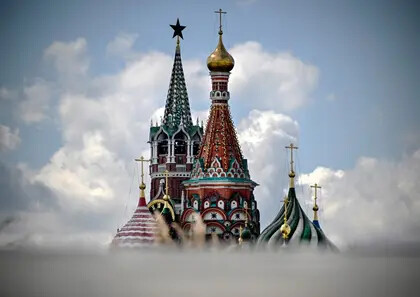
Even though Russia admits it is fighting a war against the “collective West,” leaders in the West prefer to dismiss such statements rather than muster up the political will to ensure Russia’s defeat.
This is Part 2 of the interview with Dr. Agnieszka Bryc, PhD, Nicolaus Copernicus University, Toruń, Poland. Part 1 can be viewed here.
Michał Kujawski: We would probably agree that this is not a war over territory, but a war to destroy Ukrainian statehood and identity. The topic of peace talks is increasingly appearing in the media, and some commentators argue that Ukraine will have to come to terms with the loss of some territories, which contradicts the actual goal of Russia. Do Western societies understand that this war is not about disputed territories?
Agnieszka Bryc: Poles and other countries on the eastern flank understand this perfectly. This is not a war over territory, nor is it an internal family conflict. Russia is a revisionist state that wants to replace the Western-centric liberal order with a new “concert of powers,” where a tyranny axis would dictate the rules of the game. The Kremlin doesn’t hide it – Putin and his foreign minister have repeatedly announced that the “American century” is ending and a new era of “global majority,” meaning the so-called rest of the world, is beginning. The aggression against Ukraine is therefore not an isolated issue but part of a larger puzzle. Interestingly, the West – except perhaps for the countries on the eastern flank – has systematically ignored a series of warning signals. Putin’s first war, the Second Chechen War. The poisoning of Viktor Yushchenko. The open renunciation of cooperation with the West during the Munich conference. A year later, the war in Georgia. Then the annexation of Crimea and the outbreak of war in the Donbas. And the final round in 2022. The comforting aspect is that it is increasingly accepted that there is no return to the pre-2014 status quo. Russia will not be a partner, not even a difficult partner, but will be a challenge and a threat. It remains to ensure that a secure Europe is a Europe without Russia.
The word “war” for many people is associated with front lines and kinetic actions, but for many years we have also been experiencing what is known as hybrid warfare. Are we, as Western countries, at war with Russia?
Yes. For many years, Russia has been waging an aggressive war against the West, but most people deny this fact.
Peace requires the will of both sides; conflict only requires one.
Exactly. We cannot pretend that Russia is not waging war against us, our values and the liberal order. Nor should we delude ourselves into thinking that through negotiations, the Kremlin will cease to be a threat and will refrain from neo-imperial aggression.
So, what kind of war are we engaged in with Russia?
War has many domains. In Ukraine, there is, among other things, kinetic warfare, whereas against us, Russia is waging cognitive warfare. Its front is the mind, that is, cognitive aspects. The Russians are very skilled at this because they calibrate their campaigns. Having a good cultural understanding of each target, they tailor their tools. They run different campaigns against Ukraine, Poland, the Baltic states and Western European countries. They do not target the right or the left specifically but touch on the sensitive points of each community. Generally, we are on the defensive, and that is very problematic. The one who wins is the one who first imposes the narrative. If we do not move to proactive operations, we will defeat ourselves. This means that Russia won’t have to fire a single bullet because the West will capitulate on its own. To defeat the aggressor, we need to dare to take the initiative, impose the narrative, and engage more actively in the Russian infosphere. Essentially, we need to reach a state where the Kremlin has to put out fires on its own political stage.
“We cannot pretend that Russia is not waging war against us… Nor should we delude ourselves into thinking that through negotiations, the Kremlin will cease to be a threat.”
What messages does Russia send to societies, the left and the right in its cognitive operations?
The tools used in cognitive operations are somewhat like subliminal advertising – hidden, sneaky and precisely targeted. They generate chaos and disorientation within the country to ultimately destroy citizens’ trust in state institutions and democracy as a system of values. In Poland, for example, three emotions are constantly stoked: anti-government, anti-European, and anti-Ukrainian sentiments. Every Russian diversion, whether it’s a burnt shopping center or a Shahed drone that lands on Polish territory, is immediately reinforced with accusations of total helplessness and calls of “this is not our war!” Adding to this is the fact that the current administration is strongly pro-European and Donald Tusk was one of the EU leaders, which leads to a Polish internal conflict – the same PO-PIS (Civic Platform-Law and Justice) feud, so entrenched and tribal that even Russian trolls don’t have to exert much effort here. After 2022, the Ukrainian sentiment is also being manipulated, with the enemy of both Poland and Ukraine trying to color it with hostility and animosity. This results in a flood of false stories on social media, such as “Ukrainians receive more state aid than Poles,” “Ukrainians are taking jobs from Poles,” or “because of them, it’s impossible to see a doctor.” One of the most ridiculous was: “Ukrainian women are stealing Polish men.”
Russia exploits social moods, political situations and real problems to cause destabilization. Are states countering this effectively enough?
There are campaigns to debunk fake news and expose disinformation.
However, fake news often reaches a larger audience than the campaigns that correct it.
That’s right. Verifying content and conducting informational campaigns are important, but it’s not enough. To effectively defend against Russian cognitive operations, we need to move from defense to offense.
But we are not doing it.
We are not doing that, and it is backfiring. We’re afraid of being accused of interfering in Russia’s internal affairs. That is a mistake. It is the Kremlin that shamelessly meddles in the politics of other countries, organizes political coups (like in Montenegro), conducts aggressive subversion, not to mention its habit of armed attacks on its neighbors. Meanwhile, we – the West – fear offending Putin and pushing him out of his comfort zone. This is not how you hold an aggressive despot to account.
Is the lack of such campaigns due to political decisions or legal restrictions?
It seems to be more about political will. To defeat the Russian aggressor, we don’t need to lower ourselves to Russia’s level. I believe it’s enough to avoid making mistakes. We should abandon the mistake of an incremental approach in military support for Ukraine. We should provide it with every type of weapon needed to take the initiative on the front. And we should grant it full freedom in the right to self-defense, just as Israel deals with Hamas – on the enemy’s territory. Meanwhile, we should send a message to the Kremlin that Putin is no longer a partner, meaning we withdraw recognition of his authority. There are strong legal arguments for this. And finally, if we cannot adopt new sanctions packages, we can at least tighten the enforcement of existing ones and ensure that shadow fleets do not evade sanctions.
In the cognitive dimension, the sky is the limit. We can become active in the infosphere, which not only shapes the worldview of Russians but also reflects their emotions. We have social media and messaging apps at our disposal. However, I don’t see much activity from the West on these platforms. Ukrainian activity is evident, though. Meanwhile, let’s consider how panic-stricken Kremlin propagandists were over the arrest of Pavel Durov. There seem to be more weak points in the seemingly monolithic Russian structure; we just need to not be afraid to exploit them.
Did they or didn’t they?
Yes, they did.
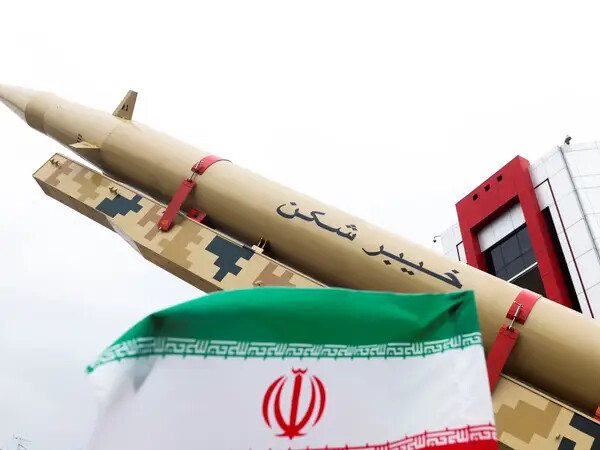
Iranian MP confirms missile shipments to Russia, downplays impact
1 hour ago
An Iranian lawmaker has confirmed media reports about Tehran’s delivery of ballistic missiles to Russia, but downplayed threats from Ukraine and its Western allies to impose “heavy” costs on Iran.
Ahmad Bakhshayesh Ardestani, a member of the Parliament’s National Security and Foreign Policy Committee, acknowledged Iran’s military assistance to Russia amid the ongoing war in Ukraine, less than 24 hours after Iran’s UN mission denied a report by The Wall Street Journal about the delivery of short-range ballistic missiles to Russia.
“We have to barter for our needs, including importing soybeans and wheat. Part of the barter involves sending missiles, and another part involves sending military drones to Russia,” Ardestani told Didban Iran on Saturday.
When asked whether sending ballistic missiles to Russia might lead to further sanctions or trigger the so-called “snapback” mechanism against Iran, the lawmaker replied, “It can’t get any worse than it already is. We give missiles to Hezbollah, Hamas, and Hashd al-Shaabi, so why not to Russia?”
“We sell weapons and receive dollars. We circumvent sanctions through our partnership with Russia. We import soybeans, corn, and other goods from Russia. Europeans sell arms to Ukraine. NATO has entered Ukraine, so why shouldn’t we support our ally by sending missiles and drones to Russia?” Ardestani said.
The Biden administration has informed its allies that Iran delivered short-range ballistic missiles to Russia, providing Moscow with a significant new military tool amid its ongoing war against Ukraine, a Friday report by the Wall Street Journal said citing US and European officials.
“The missiles have finally been delivered,” a US official said. The shipment reportedly includes several hundred short-range ballistic missiles, capable of reaching up to 500 miles. These missiles could help bolster Russia’s intensified missile attacks on Ukrainian cities and infrastructure, which have recently led to the deaths of dozens of civilians.
“We have been warning of the deepening security partnership between Russia and Iran since the outset of Russia’s full-scale invasion of Ukraine and are alarmed by these reports,” said White House National Security Council spokesperson Sean Savett. “Any transfer of Iranian ballistic missiles to Russia would represent a dramatic escalation in Iran’s support for Russia’s war of aggression against Ukraine.”
Ardestani’s comments come amid repeated official denials from Iran regarding the shipment of missiles, drones, and other military equipment to Russia.
Just hours after the Wall Street Journal’s report was published, Iran’s United Nations delegation issued a statement denying any missile or weapon transfers to Russia. The statement asserted, “The Islamic Republic has not provided weapons to any party involved in the conflict in Ukraine and has urged other countries to stop doing so.”
In reaction to the reported military shipments, European countries are considering banning Iran’s national airline, Iran Air, from flying to European airports. The new sanctions package is expected to target companies and individuals involved in the missile transfers, including transportation companies linked to these operations.
“If civilians in Ukraine die from these missiles (Tehran delivered to Russia), then Iran will pay a double price for that. The response will be severe,” a Ukrainian defense source told The Times, but did not elaborate on the nature of that response.
Russia’s access to Iranian ballistic missiles could devastate civilian populations, marking a turning point in the conflict, Farzin Nadimi, a Senior Fellow with the Washington Institute, told Iran International.
He said some of these missiles will have enough range to hit Western Ukraine and strike important targets like railway stations. “It’s going to have a really bad effect on civilians.”
Bumpskinski
I’m in awe.
